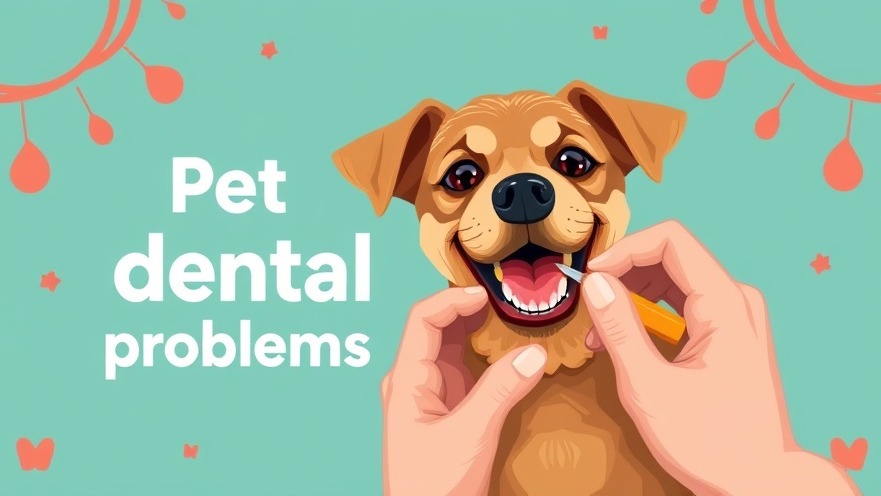
Understanding the Silent Suffering: Recognizing Dental Issues in Your Dog
As a loving dog owner, you might not realize just how critical dental health is for your canine companion. Many dog owners are unaware that at least 90% of dogs that are three years or older suffer from some form of periodontal disease. This issue not only affects their teeth and gums but can also lead to serious health complications involving the liver and heart.
The Hidden Health Risks of Poor Dental Hygiene
Dogs, much like humans, can experience severe dental issues if not treated early. Periodontal disease—a serious condition resulting from plaque buildup—can lead to painful infections, tooth loss, and other systemic health problems. The main precursor to this condition is plaque; a sticky biofilm that, when allowed to accumulate, forms hard tartar that irritates the gums, leading to gingivitis. Inflammation from gingivitis can create a cycle of further complications.
Signs Your Dog Might Be Facing Dental Problems
How do you know if your dog is suffering silently? Observant pet owners should look out for changes in behavior, such as increased irritability or a loss of interest in favorite toys and food. Bad breath, redness or bleeding of the gums, and noticeable tartar buildup are also red flags. Unfortunately, dogs can’t vocalize their discomfort, so it’s up to us, the pet parents, to be vigilant.
Practicing Preventative Dental Care for Your Canine
With regular care, you can keep your dog's teeth healthy and their gums strong. Daily tooth brushing is the gold standard in pet dental care. Dog-friendly toothpaste is a must! Beyond brushing, providing dental chews and a balanced diet can also help combat plaque buildup.
While prevention is key, some dogs may develop severe dental issues that require professional cleaning. Scheduling regular veterinary check-ups can help catch any concerns before they escalate, safeguarding your pet’s overall health.
The Emotional Impact and Why It Matters
Your dog's well-being is tied to their oral health, and being aware of this can significantly impact their quality of life. Imagine your furry friend, usually playful and energetic, suddenly becomes withdrawn due to unseen pain. Taking proactive measures to address dental care not only supports their physical health but also nurtures their emotional happiness.
Debunking Myths about Canine Dental Health
A common misconception among dog owners is that dogs rarely need dental care because they don’t develop cavities like humans. While it’s true that the cavity-causing bacteria are less prevalent in dog mouths, this does not absolve them from dental health issues. Periodontal disease is a prime example of how neglecting oral hygiene can lead to grave consequences.
Future Trends in Veterinary Dental Health
The awareness around canine dental health is evolving, with more veterinarians emphasizing the importance of regular dental check-ups and cleanings within overall wellness plans. As pet owners become more educated about these issues, we might see a decline in the prevalence of dental disease and its associated health complications—making way for happier, healthier pups.
Actionable Steps to Enhance Your Dog's Dental Health
As responsible pet owners, it’s crucial to integrate dental care into our dog’s daily regimen. Here are a few immediate actions you can take right now: 1) Schedule a vet check-up specifically for dental evaluation, 2) Implement a daily brushing schedule, and 3) Invest in dental treats that can aid in cleaning your dog’s teeth.
Taking these steps ensures your beloved pet can enjoy a longer, happier life free from dental pain. Remember, when it comes to your dog's health, a proactive approach yields the best results!
 Add Row
Add Row  Add
Add 




 Add Row
Add Row  Add
Add
Write A Comment